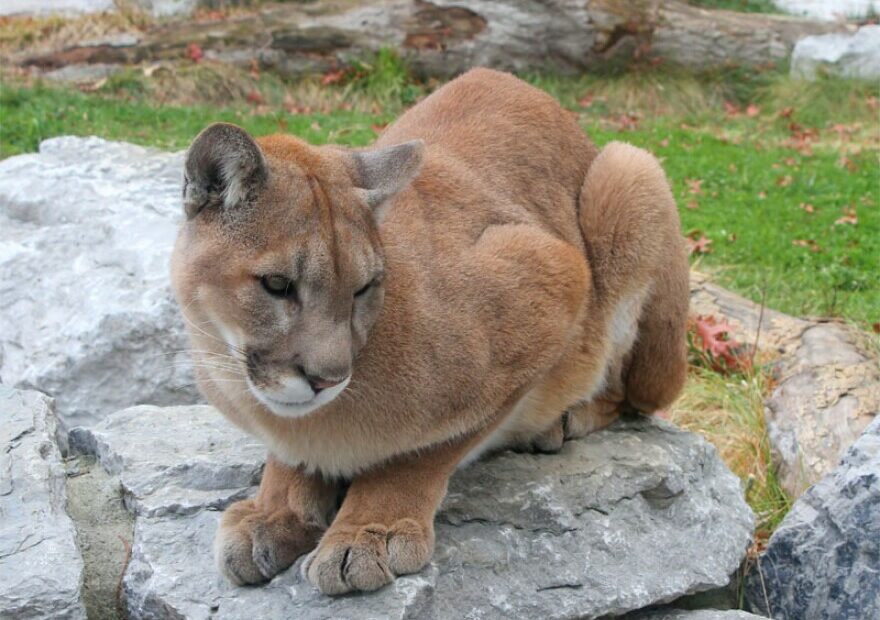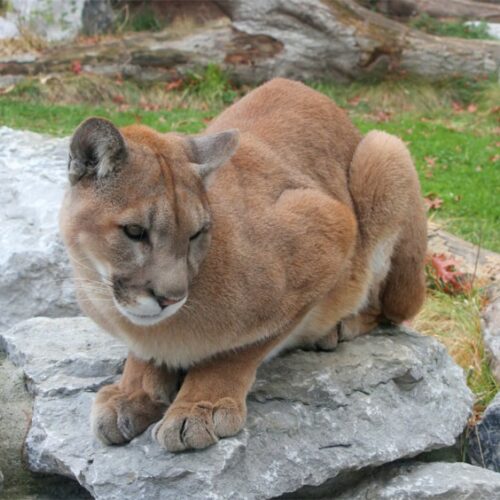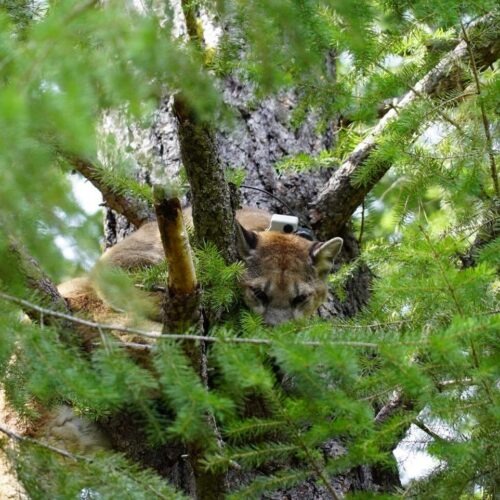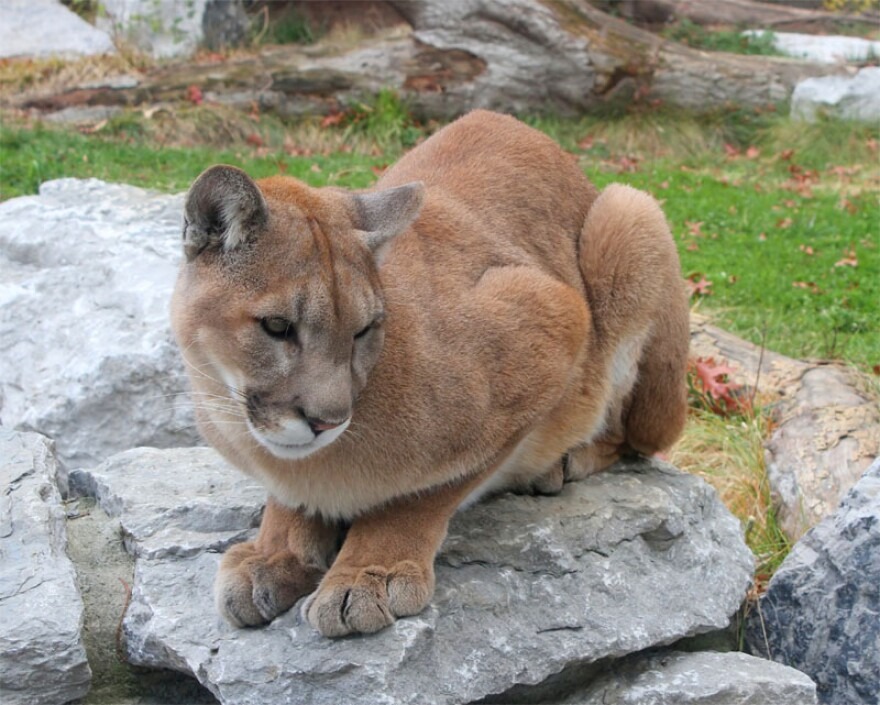
Washington Bill Aims To Stop Controversial Cougar Hunts In Klickitat County
Read
A new bill in the Washington Senate aims to stop a controversial policy in Klickitat County, where the sheriff deputized six hound handlers to track and kill any cougars he deemed to be a safety threat.
In 2019, Klickitat County Sheriff Bob Songer established the posse who are dispatched to calls about cougar concerns in the area. The sheriff’s wildlife policy on dangerous wildlife has angered conservationists who worry it harms the state’s cougar population.
Now, Sen. Kevin Van De Wege, D-Sequim, wants to take the hound hunts out of the hands of the sheriff and give the authority to state wildlife enforcement officers.
“I’ll be totally honest, this is about Klickitat County and Sheriff Songer potentially doing some more sporting hunts using dogs than hunting down what the state or feds would consider dangerous cougars,” Van De Wege said at a Senate Agriculture, Water, Natural Resources and Parks committee hearing Tuesday.
If signed into law, SB 5613 would remove one word from an earlier version of the bill. The removal of that one word – county – would mean a sheriff’s department must notify and work with the state Department of Fish and Wildlife before deputized hound handlers pursued cougars.
In every other county in the state, Van De Wege said, sheriff’s departments work with the Department of Fish and Wildlife before using hounds to hunt cougars.
However, Songer said his department works well with state enforcement officers, not so much with state biologists.
At the hearing, the Department of Fish and Wildlife said Songer’s cougar hunts have a negative impact on cougar management in the state.
From August 2019 through December 2020, Klickitat County hound handlers have killed at least 27 cougars and tracked cougars with hounds at least 80 times, said Kessina Lee, Southwest Washington’s Department of Fish and Wildlife regional director.
“In almost all of those cases DFW was not notified as part of the Klickitat County Sheriff’s Office response. Therefore, we weren’t able to offer any assistance to landowners,” Lee said.
However, Songer said the sheriff’s office has notified the Department of Fish and Wildlife each time hound handlers killed a cougar. Klickitat County has not notified the department every time hound handlers are sent to track a cougar, he said. Songer said that often happens when the handlers don’t find a cougar.
Moreover, Lee said, using only hound handlers to respond to cougar concerns is like using one tool in the toolbox.
To prevent recurring cougar problems, department staff work with landowners, she said.
In a 2019 Facebook post, Songer said multiple cougar sightings in Klickitat County led to what he called a serious public safety concern.
Songer then established a group of volunteer hound hunters who respond to any so-called problem cougar sightings reported in Klickitat County to track and kill the problem cougars, which causes concern about the well-being of livestock or people.
Songer said handlers cut off an ear of each cougar they killed to discourage trophy kills.
However, conservationists said simply seeing a cougar doesn’t amount to a public safety threat.
“I really can’t tell you how much heartache this has caused people in Klickitat County to have armed posses roaming over our lands, sometimes without our permission, sometimes killing animals, sometimes leaving them to rot on our land,” said Rachel Haymon, a resident of Klickitat County.
On the other hand, ranchers said cougar attacks have caused stress and a loss of livestock. Rancher Mark Henke, who lives 15 miles west of Yakima, said he’s lost 10 cattle on his ranch to cougar attacks since 2005.
“We need to be able to turn to our county government to help protect us from dangerous apex predators. We cannot afford to get caught in a game where the state department is playing politics,” Henke said.
Lee said the Department of Fish and Wildlife values collaboration with sheriff’s departments. Department enforcement officers noted that the bill would allow any officer nearby to immediately respond to cougars that posed an imminent threat; the bill would just limit the use of hound handlers in pursuing cougars.
“We understand this is a statewide solution to what is presently a localized issue,” Lee said.
In that respect, Stevens County Sheriff Brad Manke said his department most often coordinates cougar response with the Department of Fish and Wildlife. However, he said, his office doesn’t always notify the department because its staff aren’t readily available at all times.
Timothy Coleman, the executive director of the Kettle Range Conservation Group, said the Steven’s County Sheriff’s Office has killed more than 100 cougars spanning Stevens and Ferry counties in northeastern Washington.
“The bill puts everything in the hands of experienced, professional wildlife managers under federal and state agency control,” Coleman said.
In response to criticism, Songer said Klickitat County hound handlers respond to calls from the public.
“You’ll have people telling you, ‘It’s just cats traveling through the county. It’s no harm to humans or livestock.’ That’s a bunch of B.S.,” Songer said.
However, conservationists said cougars are critical to healthy ecosystems and rarely cause problems.
“Klickitat County’s hound hunting authority is decimating the county’s cougar population,” said Gabrielle Gilbert, who lives near White Salmon in Klickitat County.
According to the Washington Department of Fish and Wildlife around 2,000 cougars live in the state. In 2016, the department estimated no more than 50 adult cougars lived in Klickitat County.
“Ever since we started the program, yes, there’s been a number of cougars taken. But I have no problem saying every one of those cougars that was taken was a justified hunt by the hound hunters based on public safety and livestock,” Songer said.
However, conservationists told Northwest Public Broadcasting that entering Klickitat County is a death sentence for cougars.
Call logs provided to NWPB show a variety of reasons the hound handlers were dispatched to track cougars.
In one call, someone said a cougar killed a goose near a house. Another time, someone spotted a cougar exiting a sheep pasture. Once, someone noticed a cougar lying under a treehouse. Another person called after seeing a cougar sitting on a rock 60 feet from a house. A neighbor called the police after the person saw a cougar on a walk.
Not all of the cougars were killed. Often the tracking dogs could not find a cougar scent.
In 1996, a voter initiative made it illegal to hunt cougars with hounds in Washington, unless cougars threatened livestock, pets or public safety.
Wildlife advocates said Songer’s hound hunting posse violates the 1996 voter initiative because most cougars sighted in the county haven’t threatened people, pets or livestock.
In 2021, wildlife advocates sued to put a stop to the cougar posse in Klickitat County. The lawsuit called Songer’s policy illegal under the 1996 voter initiative that banned the use of hounds to hunt cougars in Washington.
However, a Benton County Superior Court judge ruled in September 2021 that the policy wasn’t illegal. Wildlife advocates are appealing the judge’s ruling.
Related Stories:

Real-life cougar stalks Washington State University’s lambs in Pullman, home of the Cougars
A Cougar statue at Washington State University in Pullman. A real-life cougar is suspected of killing several spring lambs at WSU this week. Officials are warning students, staff and faculty

Judge Rules Klickitat County Sheriff’s ‘Dangerous Wildlife Policy’ Isn’t Illegal
Wildlife advocates sued Klickitat County Sheriff Bob Songer after he deputized hound handlers to track and kill cougars.

New Rule Allowing Hound Training For Cougar Tracking Highlights Wildlife-Human Challenges
The Washington Department of Fish and Wildlife Commission recently approved a new rule that could soon grant George’s wish. But the rule is not without controversy. Many conservationists worry that training more hound handlers could put a strain on Washington’s cougar population and lead to catastrophic unintended consequences for the big cats.
















